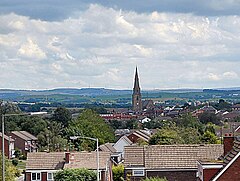Our website is made possible by displaying online advertisements to our visitors.
Please consider supporting us by disabling your ad blocker.
Heywood, Greater Manchester
| Heywood | |
|---|---|
 A view of Heywood, towards St Luke's Church | |
Location within Greater Manchester | |
| Area | 7 sq mi (18 km2) |
| Population | 28,205 (2011) |
| • Density | 4,029/sq mi (1,556/km2) |
| OS grid reference | SD855104 |
| • London | 169 mi (272 km)SSE |
| Metropolitan borough | |
| Metropolitan county | |
| Region | |
| Country | England |
| Sovereign state | United Kingdom |
| Post town | HEYWOOD |
| Postcode district | OL10 |
| Dialling code | 01706 |
| Police | Greater Manchester |
| Fire | Greater Manchester |
| Ambulance | North West |
| UK Parliament | |
Heywood is a town in the Metropolitan Borough of Rochdale, Greater Manchester, England,[1] in the historic county of Lancashire. It had a population of 28,205 at the 2011 Census.[2] The town lies on the south bank of the River Roch, 2 miles (3.2 km) east of Bury, 4 miles (6.4 km) southwest of Rochdale, and 8 miles (12.9 km) north of Manchester. Middleton lies to the south, whilst to the north is the Cheesden Valley, open moorland, and the Pennines.
The Anglo-Saxons cleared the densely wooded area, dividing it into heys or fenced clearings. In the Middle Ages, Heywood formed a chapelry in the township, around Heywood Hall, a manor house owned by a family with that surname. Farming was the main industry of a sparsely populated rural area.[3] The population supplemented their incomes by hand-loom woollen weaving in the domestic system.[4]
The factory system in the town can be traced to a spinning mill in the late 18th century. Following the introduction of textile manufacture during the Industrial Revolution, Heywood developed into a mill town and coal mining district. A period of "extraordinary growth of the cotton-trade" in the mid 19th century was so quick and profound that there was "an influx of strangers causing a very dense population".[3][4] The town became a municipal borough in 1881.[3] Imports of foreign cotton goods in the mid-20th century precipitated the decline of Heywood's textile and mining industries, resulting in a more diverse industrial base. The town was well respected for the quality of its cotton goods. The Queen Mother once visited Heywood in the very early 1900s to admire the cotton in its factories. Cotton from Heywood cotton mills was used to create the dress that she wore for her 50th birthday celebration speech.[4]
Heywood is close to junction 19 of the M62 motorway, which provides transport links for the large distribution parks in the south of the town. The 1860s-built 188-foot (57 m) tall Parish Church of St Luke the Evangelist dominates the town centre and skyline. Heywood was the birthplace of Peter Heywood, the magistrate who aided the discovery of the Gunpowder Plot, whose family seat was Heywood Hall. Heywood has a station on the East Lancashire heritage railway.
- ^ "Greater Manchester Gazetteer". Greater Manchester County Record Office. Places names – G to H. Archived from the original on 18 July 2011. Retrieved 17 October 2008.
- ^ "Town population 2011". Retrieved 7 January 2016.
- ^ a b c Lewis 1848, pp. 501–505.
- ^ a b c Metropolitan Rochdale Official Guide
Previous Page Next Page



